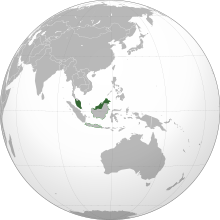

Squatting in Malaysia is the occupation of unused or derelict buildings or land without the permission of the owner. Squatting began after World War II and is governed by various laws. Recently, the government has announced its intention to house squatters in affordable housing.
History
Before World War II, there was not much squatting in Malaysia. Squatting by displaced people increased during the Japanese occupation between 1941 and 1945. Whilst fighting for independence from the British Empire, the Malayan National Liberation Army (MNLA) found support amongst the 500,000 Chinese squatters living on the edge of the jungle. To counter the threat, the squatters were forcibly resettled into camps. After the Malayan Declaration of Independence in 1957, squatting in Malaysia increased as the country industrialised and many people moved from the countryside to the capital Kuala Lumpur. Squatters occupied government land and infill sites such as railway cuttings and swampy land. By the 1970s, estimates of the number of squatters in Kuala Lumpur ranged from 175,000 to 225,000 people. In 1973, 80% had no electricity, 75% no running water and 35% no sewerage.
Legality
The National Land Code 1965 (Section 425) defined squatting as occupation of land without permission from the appropriate authorities. The Essential (Clearance of Squatters) Regulations 1969 stated that any construction on land without permission from the appropriate authorities can be considered squatting. In 1974, this was adapted to also cover land. An important case was Sidek bin Haji Mohamad & 461 Ors v The Government of Malaysia (1982, 1 MLJ 313), which confirmed squatters have no right in law. Occupation of state-owned land is a crime punishable by a fine of up to RM10,000 or 1 year in prison, or both. Adverse possession is not recognised in Malaysia.
Order 89 of the Rules of Court 2012 allows owners to claim possession of property occupied by squatters, to be implemented by a writ of possession. When this law applies has been challenged by cases such as the Court of Appeal case of Tekad Urus Sdn v Penduduk-penduduk yang Menduduki Kawasan yang dipanggil Desa Perwira (2004, 2 CLJ 516).
Recent events
Federal Territories Minister Khalid Abdul Samad declared in 2019 that the government intended to house squatters in affordable housing. During the COVID-19 pandemic in Malaysia, people from Palau squatted at Kampung Sembulan Tengah.
References
- ^ Aiken, S. Robert (1981). "Squatters and Squatter Settlements in Kuala Lumpur". Geographical Review. 71 (2): 158–175. doi:10.2307/214185. ISSN 0016-7428. JSTOR 214185.
- Bottiglieri, Michael A. (2000). "How to defeat insurgencies: Searching for a counter-insurgency strategy". hdl:10945/9342.
- ^ Ness, Gayl D. (8 January 2021). Bureaucracy and Rural Development in Malaysia: A Study of Complex Organizations in Stimulating Economic Development in New States. University of California. p. 59. ISBN 978-0-520-36140-9.
- ^ Ibrahim, Irini; Aziz, Norazlina Abdul; Hussain, Faridah; Aminudin, Noraini; Yahya, Michael Andrew Young Suleiman (2012). "Issues and Policies on the Aftermath of Squatters Resettlement: A Case Study on Kg. Desa Hormat Tambahan, Selangor". Procedia - Social and Behavioral Sciences. 36: 698–706. doi:10.1016/j.sbspro.2012.03.076.
- ^ Kader, Abdul; Zubaidah, Sharifah (14 December 2011). "Eviction of Unlawful Occupiers of Land in Malaysia – Judicial Responses and Policy". SSRN. Social Science Research Network. doi:10.2139/ssrn.2199758. S2CID 219367939.
- "Malaysia – The Problem With Squatters". Conventus Law. 11 October 2017. Retrieved 7 March 2021.
- Staff writer (21 April 2019). "Khalid: Provide adequate houses to overcome squatter problems | Malay Mail". Malay Mail. Retrieved 7 March 2021.
- Goh, Jimmy (3 March 2021). "Squatting in the open amid the Covid scare | Daily Express Online – Sabah's Leading News Portal". Daily Express. Malaysia. Retrieved 7 March 2021.
Further reading
- Johnstone, Michael (December 1983). "Urban Squatters in Peninsular Malaysia: A Marginal Workforce or a Third World Proletariat?". The Australian and New Zealand Journal of Sociology. 19 (3): 491–516. doi:10.1177/144078338301900307. S2CID 143997481.
| Squatting | |
|---|---|
| By country |
|
| Movements |
|
| In culture |
|
| Related topics | |